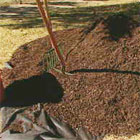It is very important to mulch your garden. Mulch helps to stabilise soil temperatures in the root zone, it suppress weed growth and it assists with water retention in the soil. The garden in our story was not mulched and some of the plants were struggling to survive in drought conditions. Don explained how to calculate the amount of mulch needed, and how to apply it to the garden bed.
Mulching formula
1. Find the square of the area to be mulched (use either a tape measure or pace it out). The garden bed in our segment was 12m x 1m, or 12 square metres.
2. For a mulch 100mm or 4″ (1/10 of a metre) deep, divide the square area by 10. In this case, 12 square metres divided by 10 gave us 1.2 cubic metres.
3. Don rounded up that figure and ordered 1.5 cubic metres of composted pine bark to mulch the garden bed.
Types of mulch
Organic mulches break down and release nutrients into the soil. Examples include lucerne hay, pea straw, rice hulls, mushroom compost, leaf litter, compost and composted pine bark.
Inorganic mulches such as pebbles, rocks and boulders look good and keep the ground underneath cool and moist. They are often used around cacti and other succulents that do not require additional organic matter.
Mulching tips
Before mulching, remove any grass, weeds and dead plants from the bed.
Put in any new plants before applying your mulch layer.
If installing an irrigation system, such as a drip system, do so before mulching.
Mulch to a depth of 75-100mm (3-4″) deep.
Mulch can be applied at any time, but is best applied in mid spring or early summer.
Do not pile mulch up against the stems and trunks of plants. Piling mulch against stems can lead to trunk rot.
While mulch helps to retain soil moisture, mulched gardens still need watering (water restrictions permitting).
Top up the mulch regularly to maintain desired thickness.
Further information
Composted hort. grade pine bark costs about $70 per cubic metre from landscape suppliers.



